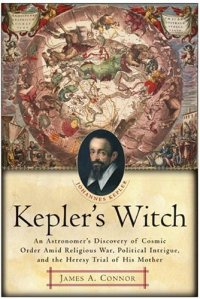
Ebook: Kepler's Witch: An Astronomer's Discovery of Cosmic Order Amid Religious War, Political Intrigue, and the Heresy Trial of His Mother
Author: James A. Connor
- Genre: History // Memoirs; Biographies
- Tags: Библиотека, Жизнь выдающихся людей, Ученые изобретатели деятели науки, Иоганн Кеплер
- Year: 2005
- Publisher: HarperOne
- Language: English
- pdf
Isaac Newton said that if he had seen farther than others, it was because he was standing on the shoulders of giants: Nicolaus Copernicus, Tycho Brahe, Galileo Galilei, and Johannes Kepler. James A. Connor focuses on one of those giants in his fascinating and largely untold story of the ''Protestant Galileo,'' Johannes Kepler. Set against the backdrop of the witchcraft trial of his mother, Kepler's Witch vividly brings to life the tidal forces of the Reformation and Counter-Reformation, submerging us into these turbulent times, revealing not only the surprisingly spiritual nature of early modern science, but Kepler's role as a neglected hero of conscience.
The doorway into Kepler's life and times begins with the sensational witchcraft trial of his elderly mother, Katharina, an eccentric woman who, like Kepler, was too smart for the world she lived in. The story is filled with crooked judges, sadistic bailiffs, and nasty neighbors bent on the destruction of this single, half-mad old woman. Using never-before translated transcripts of the trial, Connor explains that witches in the seventeenth century were the terrorists of their day. Tragically, thousands of people -- mostly women -- had gone to the stake by the time of Katharina Kepler's trial.
Johannes Kepler's life thus became a pilgrimage, a spiritual journey into the modern world through disease and horrible injustice on the eve of Europe's terrible and bloody Thirty Years' War. Kepler was concerned with more than scientific discoveries and achievement -- he fought for peace and reconciliation between the Christian churches, even when it nearly cost him his life. Exiled twice by Catholic princes and excommunicated by his fellow Lutherans, he was unbowed in his scientific and moral vision.
Besides the witchcraft trial records and testimonies, Connor has translated many of Kepler's diary entries and correspondence into English for the first time. With a great respect for the history of these times and the life of this man, Connor's unforgettable story illuminates Kepler, a man of science, as well as Kepler, a man of uncommon faith and courage.